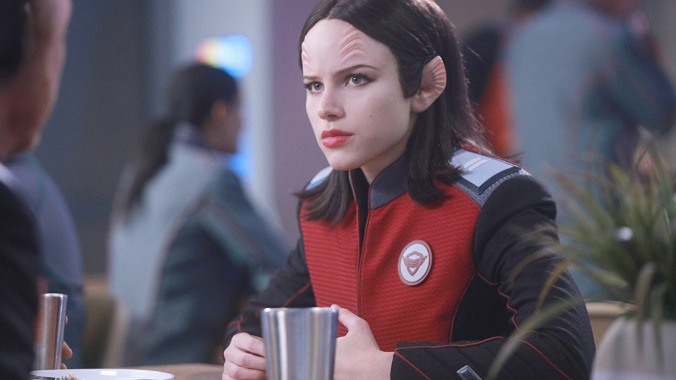The Orville’s second episode, “Command Performance” returns with a more inventive plot, but still struggles with the same problems that afflicted the series premiere. Much of the positive feedback for the show highlights its optimism; after a surprisingly long-lived “dark and gritty” era in entertainment, seeing people solve problems while being generally kind to each other is an emotional salve on our collective bruised psyches. And I agree positivity is The Orville’s greatest strength. However, that positivity isn’t sufficient to overcome the show’s flat characters. Or, sadly, that it’s not very funny.
The episode’s initial setup is promising. The Orville answers a distress beacon from a stranded civilian ship inexplicably carrying Captain Mercer’s parents (featuring Jeffery Tambor as his colon health-obsessed father). Despite being suspicious, Mercer and Grayson take a shuttle over to the immobilized ship. Once aboard, the ship is revealed to be a holographic facade disguising a device that kidnaps the pair. With both the captain and XO gone, command of the ship would fall to Bortus, but he’s laid an egg that requires a 21-day incubation period. The scenario highlights The Orville’s struggle to find a voice. While it’s goofy to have a hulking, taciturn alien sitting naked on an egg, the show makes pains to honor Star Trek’s dedication toward respecting non-human breeding and child-rearing habits. Most of the humor revolves around Bortus’ stone-faced seriousness to Mercer’s sputtering borscht-belt jokes. Only a half-hearted, “It must come out of his butt” joke made by Malloy and LaMarr as they speculate on the logistics of Moclan child-birthing remains as a wan concession to MacFarlane’s established raunchier sensibilities.
With Bortus away, an inexperienced Alara Kitan is placed in charge. What should have been a welcome chance to build on her character results in a disappointing story arc. Kitan feels incapable of leading, and her insecurity compels her to make a series of rash decisions that endanger the crew. In her anxiety, she bounces from crew member to crew member looking for advice. But her responses feel like reaction, never development. A Union Admiral commands her to call off the search for Mercer and Grayson and return home. Despite her misgivings, Kitan agrees. After Malloy berates her for leaving their friends behind, Kitan immediately stands up and announces she’s defying Union orders and heading into forbidden alien space. This doesn’t feel like a reflection of any growth or insight on Kitan’s part as much as her reacting to the feedback of whomever she spoke with last. The only actual growth she demonstrates over the episode is the ability to drink a shot of tequila without vomiting.
The reveal that Mercer and Grayson’s mysterious abduction relocated them to an intergalactic zoo isn’t original, but I’m okay with that because space zoos are a reliably enjoyable sci-fi device. Second only to an intergalactic marketplace, space zoos deliver a maximum amount of alien weirdness with a minimum of effort or exposition. Surrounding Mercer and Grayson are a fishman in bright greens and earth tones, some sea urchin Cenobite dude in chalk whites and silver accents, and apparently, Ludo from Labyrinth.
Before the zoo reveal, all Mercer and Grayson know is they’re trapped in a replica of their old New York apartment. With escape impossible, the two settle in, and left alone for the first time since Grayson came aboard, grow sentimental and question their decision to separate. After a few days in confinement, however, the warm glow created by soft lighting and a synthesized spaghetti dinner wears off and two begin to grate on each other. They conclude their marriage wasn’t meant to work out after all (though in fairness, there is nobody who loves me so dearly that they wouldn’t want to murder me after a week locked inside a Manhattan efficiency apartment).
The deal Kitan strikes with the Calivon to exchange the crew for an archive of 20th century human reality TV was…fine. It’s an easy first draft joke, but it does provide the funny visual of a crowd of utterly mesmerized aliens watching raptly as Teresa Giudice flips a table.
The show’s final reveal is Bortus hatching a female offspring. I’m curious where this is leading. Is it a good thing? A bad thing? What are the cultural/political/social repercussions? What does a Moclan newborn look like, male or female? Here’s hoping the show takes it in an interesting direction.
Stray observations:
- Kermit the Frog has been upgraded from a figurine to a plushy and now acts as an inspirational device for Mercer and Kitan, which is as it should be.
- Something feels irregular and imbalanced about the show’s sets –specifically those of the Orville itself. The bridge has a very strange use of space, with lots of inexplicable dead zones. It’s like someone is clearing out the chairs on the entire starship to prepare for a dance.
- My wife recently got chickens for our backyard, so I’ve become privy to all sorts of chicken fun facts. Por ejemplo: Chickens don’t have genitals; they mate by pressing their cloaca together. I’m using the chicken’s “kissing cloaca” lovemaking technique as the template for how I imagine Bortus’ species reproduces.
- I don’t even want to talk about that alien kid they rescued. Why even bother with all that? Just to show Mercer and Grayson are good people? The way he popped out of nowhere at the end to sit on that stool and grin like a kid who makes a miraculous recovery in a flu medicine commercial made me inordinately upset. I almost expected him to look straight in the camera and wink.
- Between immediately granted, indefinite paternity leave to food replicators that synthesizes pot brownies for you all casual like, no questions asked, the Planetary Union seems like a pretty hip place to work.









































